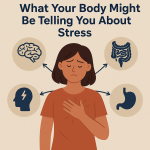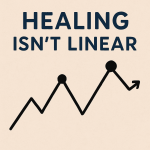Emotional Burnout: When You’re Tired in Your Soul, Not Just Your Body
Some days, it’s not just about being physically tired—it’s a deep, soul-level exhaustion that sleep can’t fix. You wake up feeling drained. The smallest tasks feel overwhelming. You’re not sad, exactly, but you don’t feel like yourself either.
This is emotional burnout, and it’s more common than most people realise—especially in South Africa, where many are silently juggling stress, responsibility, and emotional load without support.
🚫 What Emotional Burnout Is (And What It Isn’t)
Burnout is not laziness. It’s not weakness. And it’s not a lack of motivation.
Emotional burnout is the result of prolonged emotional strain. It often happens when you’re constantly giving to others—your family, your work, your patients, your community—without replenishing yourself.
It’s the psychological equivalent of trying to run on an empty tank.
🔎 Signs You Might Be Emotionally Burnt Out
✔ You feel tired no matter how much you rest.
✔ You feel emotionally numb, detached, or like you’re “on autopilot.”
✔ You feel irritable, tearful, or overwhelmed by small things.
✔ You’ve lost interest in things you used to enjoy.
✔ You feel guilty for not being able to “keep up” or be there for others.
✔ You dread things that never used to bother you.
If you’re thinking, “That sounds like me,” please know: you’re not broken, you’re burnt out.
🚫 Who’s at Risk?
While emotional burnout can affect anyone, it’s especially common in:
🔹 Mental health professionals and healthcare workers
🔹 Mothers, caregivers, and breadwinners
🔹 Teachers, social workers, and community leaders
🔹 People who are “always strong” for everyone else
🔹 Those with unresolved trauma or chronic stress
🩵 Emotional Burnout vs. Depression
It can be hard to tell the difference. While there is overlap, burnout is often linked to emotional overload, whereas depression is more pervasive and persistent across all areas of life.
Burnout may improve with rest, boundaries, and support, while depression may require more intensive clinical treatment.
If you’re not sure, speak to a professional who can help you unpack what you’re experiencing.
💪 How to Start Recharging Emotionally
📌 Rest isn’t optional, it’s essential – Prioritise proper sleep, unstructured time, and mental breaks.
📌 Say no without guilt – You are allowed to step back, even from things you care about.
📌 Reconnect with yourself – Spend time doing things that soothe you, not just distract you.
📌 Talk to someone safe – Therapy, support groups, or even a trusted friend can offer relief.
📌 Stop trying to be everything to everyone – You matter too.
🚀 Final Thought: You Don’t Need to Break to Deserve Rest
✔ You don’t have to be exhausted to justify taking a break.
✔ You don’t need permission to prioritise your mental health.
✔ You can still care for others while caring for yourself.
💙 If you’re feeling emotionally burnt out, therapy can help you refill your cup, set boundaries, and rediscover the version of you that’s been lost in the noise.




